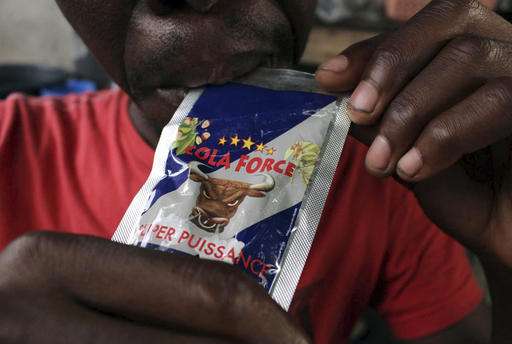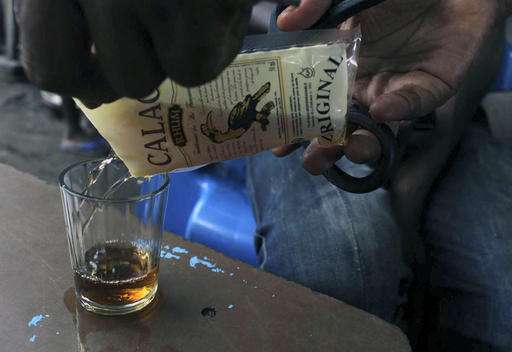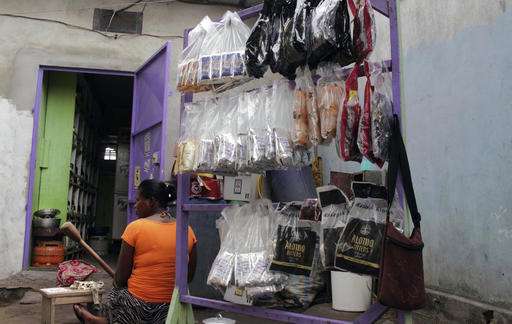Ivory Coast is latest to crack down on alcohol sachets

Each morning at dawn, taxi driver Rene Kouame stops by his neighborhood bar in Abidjan for a potent pick-me-up: two plastic sachets of "Che Guevara," a drink of spiced rum and a host of chemicals that costs 100 CFA francs, or about 15 U.S. cents.
With an alcohol by volume figure of 43 percent, the 2-ounce sachets are about as intoxicating as a typical 16-ounce beer, but consumers say that's just one of their virtues. Kouame claimed they give him a jolt of energy other drinks can't match—just what he needs to face a long day of hectic traffic, run-ins with police and testy fare negotiations.
"It inspires me. It gives me a bit of courage to confront the challenges of life," he said.
From now on, however, Ivory Coast's government wants Kouame to get his courage elsewhere. Last month, officials announced a ban on alcohol sachets, citing their health risks and the need to combat alcoholism, especially among youth.
The measure is one of more than a half-dozen bans or partial bans on alcohol sachets in effect in sub-Saharan Africa, according to the World Health Organization. Other countries with bans include Zambia, Kenya, Tanzania, Rwanda, Burundi, Congo and South Sudan, said Jean-Marie Vianny Maurice Yameogo, the WHO's Ivory Coast representative.
Tracking the sales of alcohol sachets, many containing spirits distilled from palm wine, is difficult because they are often produced outside regulated markets. The sachets are typically mass-produced in West Africa, with colorful packaging. The drink "Amour Profond," or "Deep Love," shows a man standing behind a bare-shouldered woman, whispering into her ear.

The sachets are not necessarily more potent than other drinks available. Palm wine-based traditional drinks such as koutoukou, which are similarly cheap, can have alcohol by volume rates of more than 50 percent.
But sachets are more likely to contain toxic chemicals such as methanol, or wood alcohol, Yameogo said. And the packaging often boasts of health and other benefits that Yameogo said have no basis in science. Some are said to provide cures for maladies such as hemorrhoids, while others are reputed to function as appetite-suppressants or aphrodisiacs.
Moreover, the small sachets are easy to hide, making them especially tempting for schoolchildren, according to the Ivorian government and the WHO.
"It's something that's accessible to everyone. You can buy a sachet, put it in your pocket and just walk around like that," said Patrick Gbodou, president of School Anti-Drug, an Ivorian organization that campaigns against drinking and drug use by students. The official drinking age in Ivory Coast is 21, but it is rarely enforced, and teenage drinking is common.
Vendors are worried they will take a huge hit if the ban on sachets is enforced, as many drinkers go for sachets and nothing else. "The government needs to have pity on us," said Adjo Abega, the owner of a bar in Abidjan's Port-Bouet district.

Drinkers generally acknowledge the health risks posed by alcohol sachets, but some criticized the government for cracking down on their favorite vice while permitting other health hazards such as cigarettes.
Desire N'Guessan, an unemployed 26-year-old, began drinking sachets when he was a teenager. He said he relies on them to ward off illness and for motivation to keep looking for work.
"When you are not able to overcome your timidity, it can be difficult to operate in your neighborhood," N'Guessan said.
If the government makes good on the ban, he warned, Ivorian children could turn to drugs. He also predicted marches and protests.
But Kouame, the taxi driver, was less worried. In the absence of alcohol sachets, he said he would switch up his morning routine by drinking glasses of palm wine instead, adding: "Man can adapt to anything."
© 2016 The Associated Press. All rights reserved.















